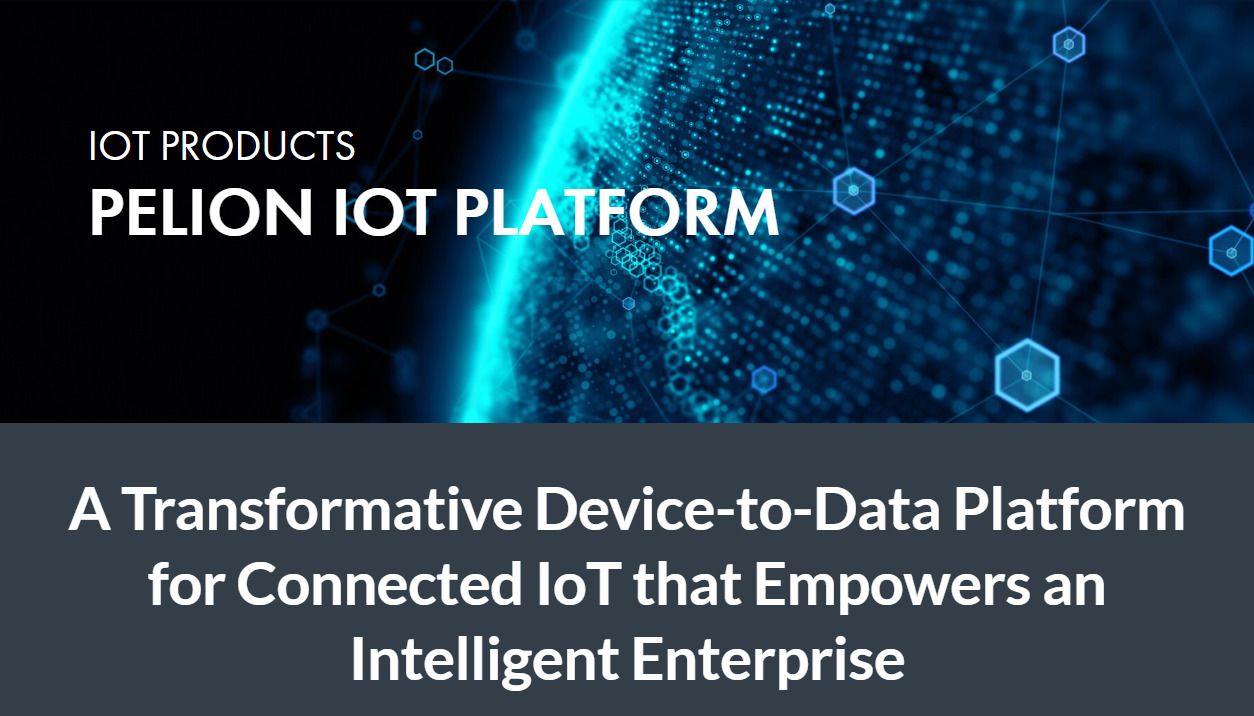What is IoT?
Internet of Things, or more commonly known as IoT, is finally gaining popularity in both consumer and enterprise markets. To explain in layman’s terms, IoT simply encompasses the idea of “connecting things in the world to the internet”. For example, you may be wearing an activity tracker on your wrist to monitor your heart rate while you work out. The data collected are then stored on the cloud via the internet, and an online service informs you of insights on your health and stamina with the data collected.
In this short example, we can see how simple data from sensors are collected via the internet, computed on the cloud, and key insights can be inferred and obtained via a smart online service. This whole process brings about value to the usual nonsensical raw data, and enables entities to act upon insights for improvements.
IoT in the Enterprise Space and its challenges
Similarly, in enterprise space, Internet of Things can bring about its benefits. By collecting data from various vital data points, companies are able gain a deeper understanding of a problem or situation as part of their business process. Of course, different organizations will make use of IoT implementations differently to suit their needs. But the ultimate goal remains the same – to gain insights and improve processes.
However, implementing IoT at an enterprise level hasn’t been an easy task. There are many challenges that companies face while building their IoT infrastructure and system today. Finoit Technologies, has written a blog post which explains these challenges in details, citing many gaps in today’s IoT eco-system. Here are the key challenges mentioned:
- Compatibility and Interoperability of Different IoT Systems
- Identification and Authentication of sensors and devices
- Integration of IoT Products with IoT Platform
- Connectivity
- Handling of Unstructured Data
- Data Capturing Capabilities
- Intelligent Analytics
- Data Security and Privacy Issues
- Consumer Awareness
- Deliver Value
To tackle these key challenges, Arm launched its Pelion IoT Platform in 2018, after the acquisition Treasure Data and Stream Technologies. The bringing together of key technologies from these two companies allows Pelion IoT Platform to be one of the world’s most comprehensive and holistic end-to-end solution for IoT Deployment and Management.
Arm Pelion IoT Platform
Building on Arm’s proven leadership as one of the world’s most trusted silicon architect, the Pelion IoT Platform transforms the way IoT creates and captures value for enterprises. The solution prides on its openness, compatibility and interoperability. To quote Arm, “Arm Pelion IoT Platform is the only IoT solution for any device, any data, any cloud”.
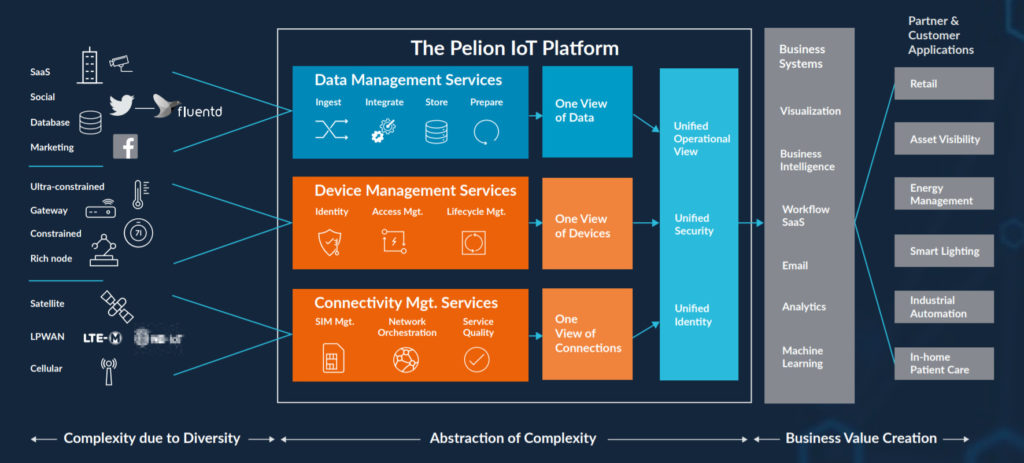
The Arm Pelion IoT Platform resolves IoT challenges by the provision of a flexible, secure and efficient foundation of connectivity, device, and data management services. The complexity which arises out from different sensors and communication standards are abstracted via the platform. This allows for a single unified view of data, devices and connections. Of course, with abstraction, enterprises can the focus on business value creation, rather than focusing on the nitty gritty of getting the technology to work.
Arm Pelion IoT Platform consists mainly of three main services, Connectivity, Device and Data Management.
Pelion Connectivity Management provides seamless global connectivity with one global mobility contract, a fully managed turnkey service, and secure IoT device connection. Features include:
- Ability to connect any device and use any SIM form factor, including eSIM
- Connectivity across standards, including LTE, 2G, 3G, 4G, CAT-M and, NB-IoT
- Simplicity of device deployment with automatic authentication, provisioning, and connection
- Convenience of a single contract for global connectivity, with access to 600+ networks
Pelion Device Management enables secure and reliable onboarding, monitoring, updates, and lifecycle management of different types of connected devices using infrastructure on premises or in cloud. Other features include:
- Freedom to select device, vendor, communication protocol, deployment option (any device, any vendor, any network, any cloud)
- Security built-in from chip to cloud to mitigate device vulnerabilities and secure the pipeline from device to data
- Reduction in complexity of managing a diverse set of devices
- Cost-effective remote management of in-field device assets
Pelion Data Management makes IoT device data and relevant enterprise data accessible in one place for predictive insights that drive optimization and new revenue opportunities. Features include:
- Ability to leverage data from any connected device by collecting and unifying disparate data
- Peace of mind from secure, trusted data
- Maximized business outcomes due to reduced time, cost, and complexity of data exploration
Out of the three, many enterprises have found Pelion’s Device Management services to be fundamental to their IoT journey. It simplifies the most complex part of device onboarding, monitoring, management, updating and upgrade, leaving enterprise to what’s more important – building business value.
Pelion Device Management Services
Arm’s Pelion Device Management solution helps enterprises to manage any IoT devices throughout its device lifecycle, while assuring complete security for extraction of trusted data. Regardless of deployment type, be it Cloud, On-Premise or through Edge gateways, Arm will be able to deliver.
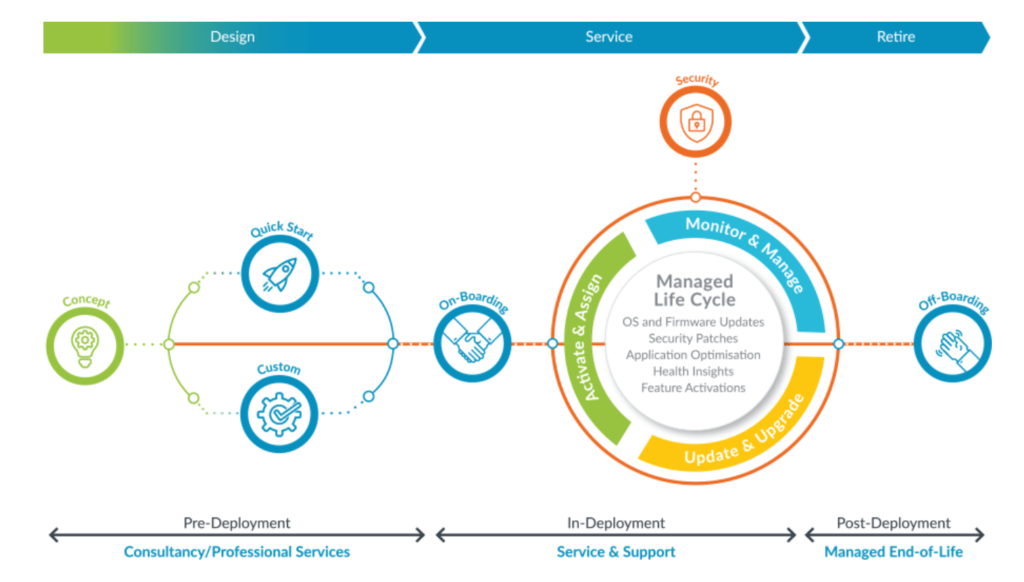
How Arm Pelion IoT Platform has helped companies around the world with IoT Device Management
1.Smart Lighting Solution in the City of Taipei – AAEON Technology Inc
In order to better conserve energy, Taipei City aims to deploy IoT nodes to 4,000 lampposts to sense ambient light levels and adapt required lighting conditions based on the environment. On top of this, security is also a key concern for this deployment.
By using the Pelion IoT platform, AAEON managed to simplify their solution for the management of the city’s device estate. Their solution had made it easy for Facilities Manager to control the IoT-enabled lighting infrastructure with the Pelion Device Management platform. They can even remotely control the lampposts to power up, dim, or switch off, depending on different conditions.
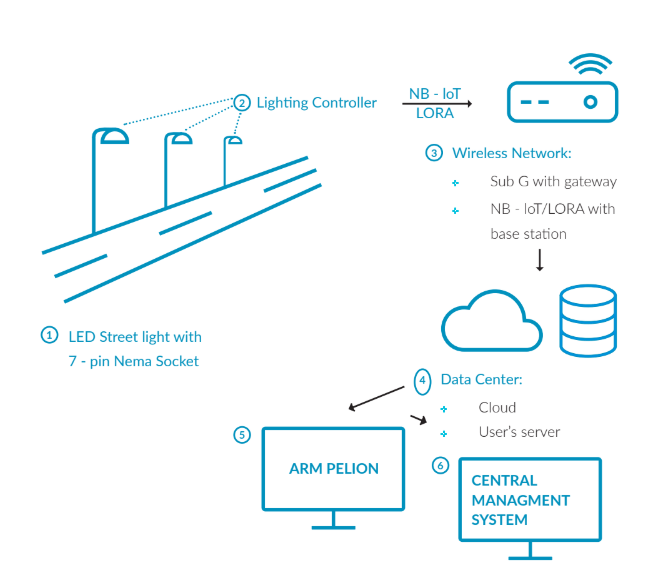
The implementation has not only allowed the city to conserve energy, thus reducing energy bills, but also allowed them to identify failing lights. The data insights collected from each lamppost also aids in the estimation of light failure, making preventive maintenance more accurate and possible.
“Repair costs to a failed light can amount to twice the cost of the light itself by the time you factor in a night shift of engineers, public liability insurance, and the disruption caused by road closures. Thankfully the insights provided by Pelion minimizes all these factors by optimizing predictive maintenance planning that pinpoints failures on a closed street before they happen, dramatically reducing repeat visits to the same location.”
- Kevin Ting, Senior Manager, Design Manufacturing Service at AAEON Technology Inc.
By using the ARM Pelion IoT platform, AAEON has effectively and quickly developed their solution to the Taipei City without even the need to invest in the development of their own proprietary solution.
2. Connecting Utilities Smart Meter at Homes at a Massive Scale – Hexing Electrical Co. Ltd.
Hexing Electrical Co. Ltd. is an Original Equipment Manufacturer (OEM) of smart meters and auxiliary equipment that provides automated metering services in real-time.
In the company’s journey to build an Automated Meter Infrastructure, with the help of IoT implementation, they aimed to complement their services with a white label metering ecosystem consisting of hardware, software and services.
As the company requires fast and reliable devices deployed over more than 90 countries of varying infrastructure and localized challenged, they needed a platform that is able to handle the scale and variations in deployments.
Thanks to Arm’s comprehensive Device Management Service through the Pelion IoT platform, they were the choice of partner for Hexing. Their implementation included a Platform Security Architecture (PSA) compliant ARM based processor, which standardized multiple and un-unified data streams into Hexing’s system via REST APIs.
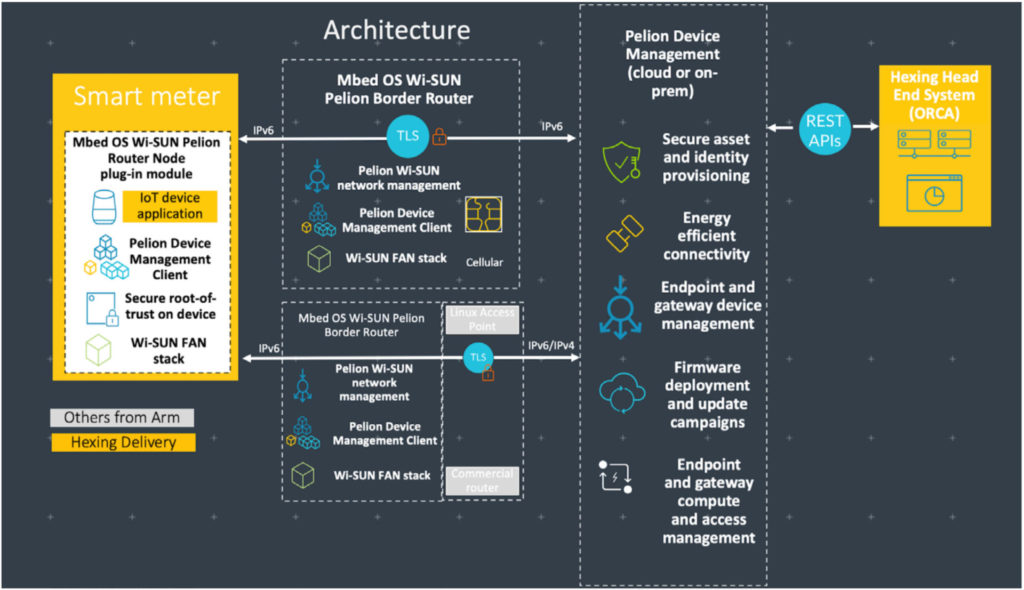
It is only Arm who could have coupled a secure processor design with a Device Management platform for an integrated solution for Hexing. Building on their expertise, they are able to achieve the company’s requirements of expected scalability and end-to-end chain-of-trust to their sensors and edge devices.
“Pelion Device Management has helped Hexing develop a flexible, open-source platform that can be deployed worldwide and remains as cost-effective and secure as it did the day it left our factory.” – Liangzhang Zhou, Chairman- Hexing
3. On-demand Smart Waste Management made possible – Alphatronics
When a French waste collection company was met with excessive manpower and fuel wastage due to inefficient dispatching of trucks to a waste management site, they went to Alphatronics for help. The issue was that the they would often answer a service call to collect recyclables and garbage from a waste management site, but would find that the containers to be empty.
Alphatronics then developed an IoT-connected that managed both local access for authorized users to enter the site, and also add sensors to the site’s containers to determine if they are full enough for a service call.
The natural solution was to use Arm Pelion device management platform as the hardware/software platform for their product, as they needed an existing IoT platform to shorten development time. Thanks to Arm Pelion device management platform’s support and compatibility with any IoT device, Alphatronics was able to get up and running within a short amount of time for the project.
Alphatronics also mentioned that they “chose Arm because of its strong support among microcontroller vendors, broad portfolio of connectivity IP, and native API support for sleep and low-power modes to keep power consumption at a minimum. The quality of Arm’s customer service and support also proved instrumental in bringing the new access control system to market.”.
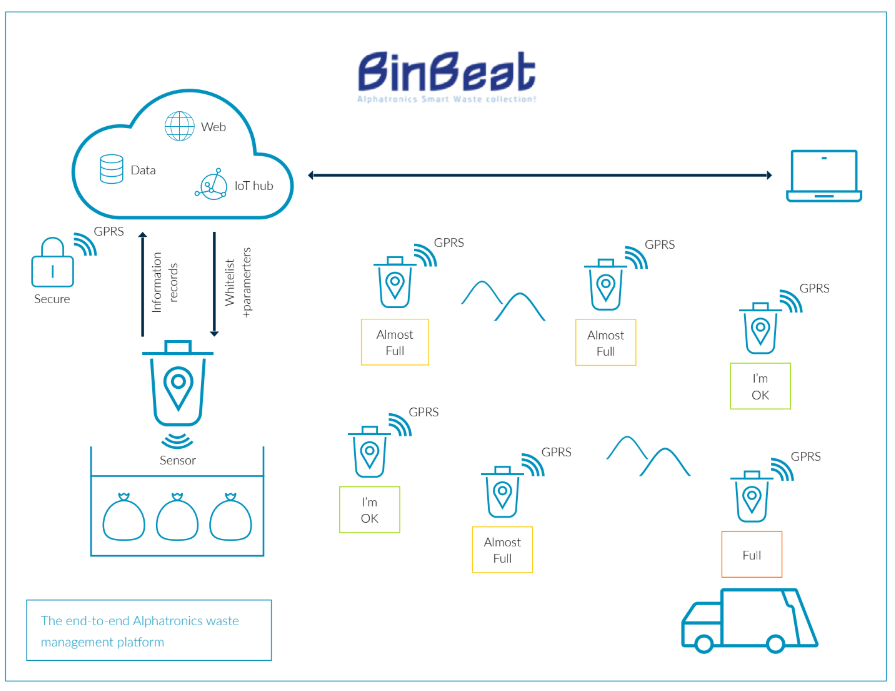
Conclusion
Even though enterprise IoT implementation can bring about many benefits, it is hampered by different challenges. Thankfully, advancements in technology and the emergence of new IoT platforms and solutions have tackled these problems.
The Arm Pelion IoT platform provides a comprehensive solution for IoT Connectivity, Device and Data management, lowering the barriers of entry to IoT implementation. Many organizations have found the Arm Pelion IoT platform to be extremely useful in their digital transformation journey, as they change the way of how their business operates with the adoption of IoT.
With the ever-growing IoT market, the Arm Pelion IoT platform will be the key to unlock the future capabilities of IoT technologies.
The Economist IoT Business Index 2020 – Get the Free Report here.
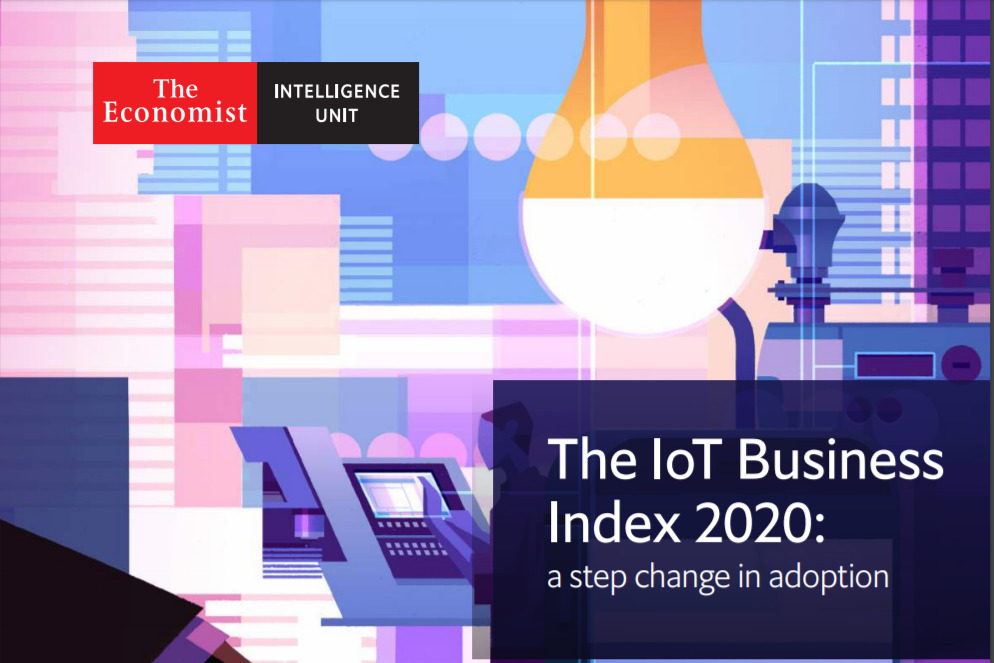
The IoT Business Index 2020 by The Economist Intelligence Unit (EIU) is based on a global and cross-industry executive survey. It reports on the latest trends in IoT implementation. This edition shows that between 2017 and 2020, a step change in IoT adoption took place.
This report examines the results of the IoT Business Index survey and draws on in-depth interviews with executives who have led or advised on IoT initiatives within companies or founded IoT-based businesses. The key findings of the study include;
- Since 2017, both internal and external-facing IoT adoption have advanced substantially
- This progress reflects increased investment
- A “path to business value” for the IoT has emerged
- The next frontier of progress will be to use IoT data strategically
- Artificial intelligence (AI) is viewed as vital to realizing the value of IoT data
- Security concerns still hamper IoT adoption
If you are interested to learn more about how IoT adoption has changed in recent years, you can download a copy of the report at this link.


